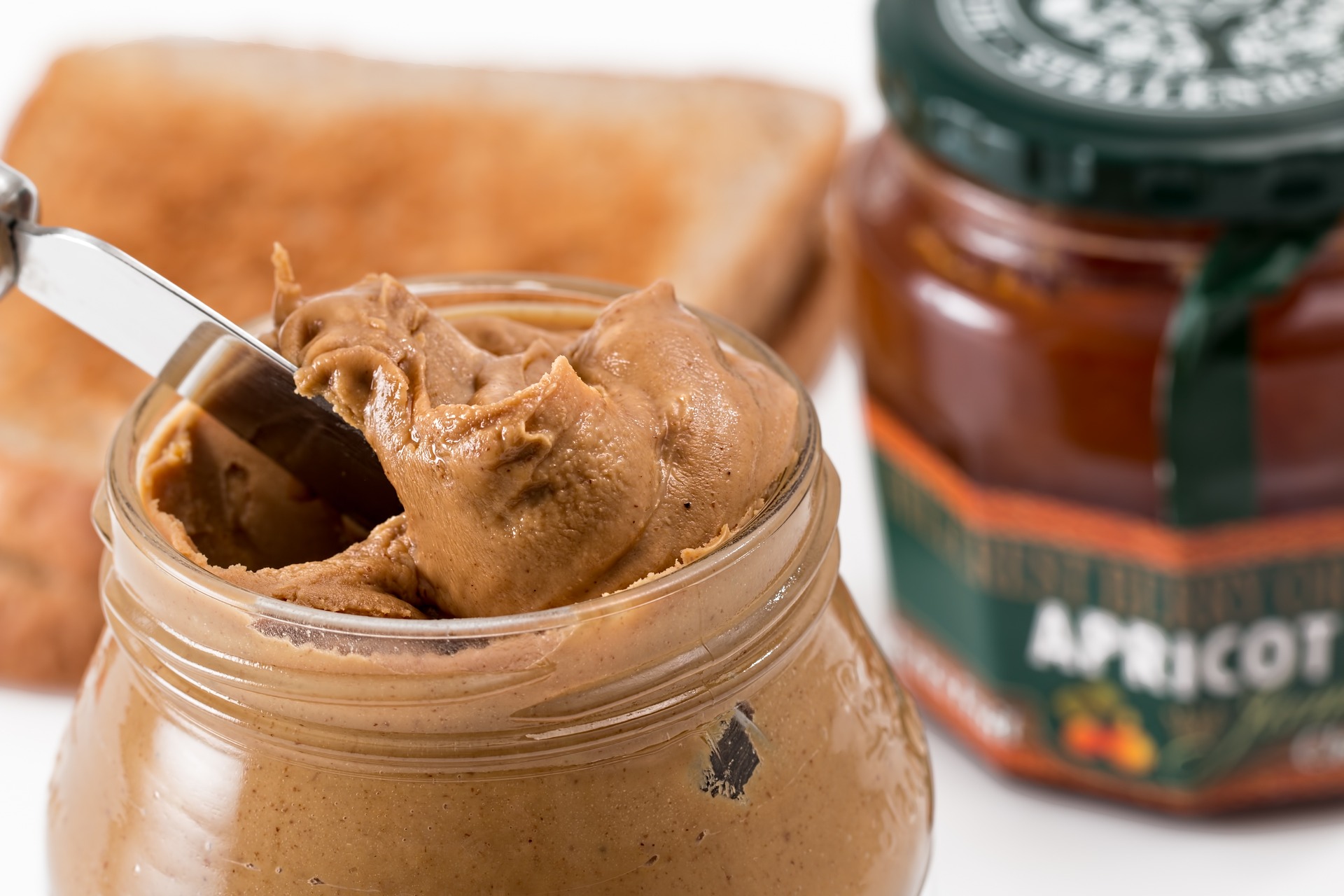As devoted dog owners, we understand the importance of maintaining our furry friend’s health and happiness. Just like us, dogs can experience digestive issues from time to time, and one common concern that arises is constipation. But can you use peanut butter for dog constipation?
Peanut butter can be of great help for dogs due to its high fiber contents that cause softer stools. That said, giving too much can also worsen the problem and even cause side effects. If this delicious treat causes problems for your dog, there are other remedies that may help.
- What is constipation, and what are its causes and symptoms?
- What are the nutritional benefits of peanut butter for dogs?
- What potential side effects should be considered when feeding peanut butter to dogs for constipation relief?
- What are some alternative natural remedies for constipated dogs?
What is constipation, and what are its causes and symptoms?
This is a digestive problem where dogs have difficulty passing stools. One common reason for this condition is dehydration. Older dogs are also exposed to developing this condition, sometimes as a result of an additional disease. Stress, low fiber in the diet, and low exercise can also be a cause.
Dogs that suffer from this condition will constantly strain and feel discomfort when defecating due to the dry, hard stools. The frequency of defecation decreases, as well as the dog’s appetite. Lethargy is another common symptom.
It is essential to find the reason for this problem and address it as soon as possible. Using peanut butter for dog constipation can be an option in some situations.
What are the nutritional benefits of peanut butter for dogs?
Besides being delicious, peanut butter is also a healthy treat for dogs as long as it is used in moderation. Peanut includes a few notable nutrients that are great for dogs.
- Proteins – There are high amounts of proteins in peanut butter that help dogs with developing healthy muscles and organs.
- Healthy fatty acids – These fatty acids are essential for providing energy, as well as keeping the skin and fur healthy.
- Vitamins and minerals – Some essential nutrients like iron, zinc, vitamin E, vitamin B, and magnesium are a part of peanut butter.
Can peanut butter act as a natural laxative?
Yes, peanut butter is safe for dogs with constipation. It contains sizeable amounts of dietary fiber which acts as a mild laxative, making the stool softer and easier to pass.
“Peanut butter is a source of fiber, with a 32-gram (g) serving providing around 10% of the daily recommended amount of fiber for someone eating 2,000 calories a day.” says, Dr. Katherine Marengo for MedicalNewsToday. Of course, dogs don’t need as many calories, but the positive effects of peanut butter are still noticeable.
Eating too much peanut butter can actually be a cause of diarrhea in dogs. Peanut butter can also be used to give constipation relief medication to dogs that don’t like swallowing pills. This delicious treat might not always work, so informing a vet first is crucial.
How much peanut butter should be given to dogs for relief?
To get the best benefits and avoid side effects, you should give around 1-2 teaspoons of peanut butter per day. The amount varies according to the size and breed of the dog. Smaller dog breeds should have less, while larger dog breeds can eat more. You can mix peanut butter with their daily food, or you can fill a chew toy with it. Chew toys and puzzle toys also help the dogs with mental stimulation.
Given too much, peanut butter can cause problems such as pancreatitis, as a result of its high fat content. This is a serious and life-threatening situation that needs immediate vet attention. If your dog doesn’t listen to you and wants to eat more, you need to train it how to stop eating before it suffers from any of these complications. Obedience training and positive reinforcement should be used in this situation.
What potential side effects should be considered when feeding peanut butter to dogs?
If a dog doesn’t get enough fiber in its diet, you might notice dog constipation triggered by peanut butter instead. This happens especially when commercial peanut butter has its fiber removed during manufacturing.
Calorie-high food
The substantial caloric value of peanut butter can also be responsible for weight gain in dogs. A continuous diet with high amounts of this delicious treat will cause obesity. Dogs that are obese, will be exposed to developing further health issues including ones in the cardiovascular system.
Allergy reactions
There are also dogs that can be allergic to peanut butter. Once ingested, they can develop rashes, itching, vomiting, nausea, and even start collapsing from the effects. The symptoms can occur fast after ingestion and require a fast reaction from their owners.
Xylitol intoxication
Some peanut butter contains xylitol, an artificial sweetener toxic to dogs. Dogs that are exposed to this toxin can develop hypoglycemia, seizures, tremors, coma, and even death. Even very little amounts of this dangerous toxin can cause bad problems for dogs.
Sodium toxicity
There are high amounts of salt in some commercial peanut butter that are also detrimental to dogs. If dogs eat too much salt, they will become dehydrated and develop an electrolyte imbalance. Dogs that are exposed to that much salt, should be given enough water to prevent dehydration.
What are some alternative natural remedies for constipated dogs?
Apart from peanut butter, several other natural remedies can help our canine companions find relief from constipation.
High-fiber diets for dogs
There are other ways to include fiber in a dog’s diet besides using peanut butter. For example, pumpkin can be used for dog diarrhea, but it also works great for constipation. It can be offered to dogs as canned pumpkin or pumpkin puree.
Another good peanut butter alternative for dog constipation is rice. It can be mixed with vegetables like green beans or sweet potatoes which are rich in fiber.
Hydration and exercise
Always provide fresh and clean water for your furry friend. If dogs don’t get enough water, dehydration develops and makes harder constipation-causing stools. Dehydrated dogs will also seem lethargic, with sunken eyes and dry mouths.
Besides water, dogs should also exercise regularly according to their needs. For example, Corgis need around one hour of daily exercise, while some dogs might need more. Taking them on regular walks, runs, or playing games can stimulate the digestive system to work smoothly.
Dog-friendly Laxatives
Stool softeners and mild laxatives can be used for dogs that suffer from pain due to constipation. This is what Dr. Alice Defarges, from MSD Veterinary Manual, has to say about laxatives:
| Laxatives are classified as bulk-forming, lubricant, emollient, osmotic, or stimulant types. Most act on fluid transport mechanisms and colonic motor stimulation. They should be avoided in the presence of dehydration. Bulk-forming laxatives are added to the diet. These products are dietary fiber supplements of poorly digestible polysaccharides and celluloses derived principally from cereal grains, wheat bran, and psyllium. They absorb water, soften feces, add bulk, stretch the colonic smooth muscle, and improve contractility. |
Home remedies like olive oil and ginger can work like natural laxatives and stimulate bowel movements. Probiotics, found in yogurt, are another essential supplement that helps with the dog’s digestive health.
So can you use peanut butter for dog constipation?
Constipation can be a real problem for dogs and needs attention to prevent complications. Peanut butter, in moderation, can provide dogs with the fiber they need for smoother bowel movements. Its high nutrient levels also help with maintaining overall gut health.
However, it’s vital to use it responsibly and consult with a veterinarian before introducing this delicious treat as a treatment. Giving too much of it can be a reason for allergic reactions or developing pancreatitis.
Luckily, there are some good alternatives to peanut butter that can also cause relief in dogs. Foods like pumpkin and rice can be included in the dog’s diet for help. Of course, vets can also recommend proper medication like laxatives for this gastrointestinal issue.
FAQ
How long does it take for peanut butter to relieve dog constipation?
Peanut butter usually takes around 2-4 hours to digest. That said, the duration it takes for any remedy to work can vary depending on the severity of constipation and the dog’s individual condition.
Can I use almond butter instead of peanut butter for dog constipation?
If using peanut butter for dog constipation doesn’t work, almond butter can be a great alternative. This tasty treat should also be fed with caution as it has similar side effects.
How long does it usually take for constipation to improve in dogs?
On its own, mild constipation should improve after around one or two days. If the problem lasts longer than this, then a consult with a veterinarian should be scheduled as soon as possible.
More dog nutrition resources
Here are a few other resources talking about giving certain foods to dogs and the effect they have on their health.
- Can dogs have ritz crackers
- Can dogs eat canned green beans
- Dog ate uncooked rice
- Horse meat for dogs
- Can dogs eat ice cream cones
You can find a lot more information on the types of food you can feed your dog on our site Dogisa!
Can Dogs Eat Potato Salad Safely? Exploring the Risks and Benefits
When it comes to feeding our furry friends, it’s essential to know which human foods…
Can Dogs Eat Sauerkraut: Benefits, Risks, and Serving Sizes
Sauerkraut, a fermented cabbage dish popular in many cuisines, has gained attention among dog owners…
Can Dogs Have Fennel? Exploring the Benefits and Safety
As loving dog owners, it’s natural for us to ponder about the safety of certain…
Can Dogs Eat Mushroom Soup? A Simplified Guide
Dogs can eat a lot of different fruits and vegetables that are part of their…
Can Dogs Eat Pinecones? This Is What Happens When They Do
Walking the dog around the park is an everyday activity that we and our dogs…
Can Dogs Eat Ice Cream Cones? – How To Make Substitutes
Ice cream is one of the best treats to have during summer. Usually, ice cream…







